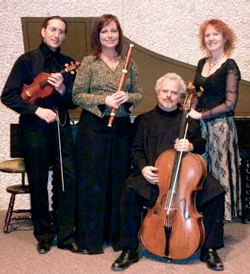by Nicholas Jones

Since their highly successful European tour in May, Cleveland’s baroque band sounds tighter and more coherent than ever. Apollo’s Fire draws period instrumentalists of the highest caliber, capable of playing the most demanding passages with precision and spark. The string sections — and this was primarily a string concert, with one notable exception — perform as if with a single intention, rhythmically precise and united in their sense of tone, like choirs that zero in on a single vowel and make many voices sound like one. The scrupulous avoidance of vibrato (a Romantic invention in string playing) is crucial to the tonal focus that the Apollonians achieve.
The first piece on this weekend’s birthday party was Bach’s Concerto for Violin in E, featuring concertmaster Olivier Brault. In the baroque language of keys, E major signals brilliance and bravado. Jovial and energetic, the concerto was a masterful opening to the celebration. It sounded both declamatory (its famous opening a simple but assertive ascending triad) and contemplative, balletic and lyrical at once. Brault’s solo playing was finer and more centered than I have ever heard him before: sensitive but assertive, sprightly but relaxed.
Sorrell joined visiting artist Joe Gascho in the Concerto for Two Harpsichords in C minor. The minor-key, introspective piece was an effective contrast to the flamboyant and outer-directed violin concerto. The string sections achieved a dark, mellow timbre miles removed from the bright gaiety of the earlier piece.
The economics of a baroque orchestra in the 21st century seem to demand a sizeable hall: you need to fill the seats to pay the bills. And there are, blessedly, a number of fans to accommodate: the concert was sold out. Yet with certain instruments — such as the harpsichord — a hall that’s big enough for the fan-base can easily be the wrong hall for the music.
Though the concerto was performed with evident virtuosity, the harpsichord parts were scarcely audible, even from close up. The cavernous spaces of Rocky River Presbyterian negated many subtleties — or even at times the bare bones — of the solo performances, brilliantly played as they surely were. An effort was made to amplify the harpsichords electronically, but for the most part it was unsuccessful, and when I could distinguish the amplified sound, it was tinny and unconvincing.
The most successful part of the concerto was the well-known middle movement, where the orchestra played pizzicato and the harpsichords, in a tuneful dialog with each other, gained a significant presence in the room. At times, I could almost believe that these keyboard players, restricted though they are to notes of transitory duration, had found some blessed way of actually sustaining the notes in Bach’s lyrical musical lines.
J.S. Bach’s birthday bash extended to include his fifth and arguably most successful child, Carl Philipp Emanuel Bach, who this year celebrates his 300th birthday, though without quite the worldwide fanfare given to his more famous father. Complicated and fascinating in a wholly different way from his father’s contrapuntal music, C. P. E. Bach’s Symphony in B-Minor (Wq. 182/5) is more unsettled, full of sudden contrasts and drastic shifts in tonality. The serene and godly J. S. was probably turning in his grave as his talented son composed this highly romantic music. Operatic and expressive, pivoting suddenly on expected modulations, this is music for a new, revolutionary age, and Apollo’s Fire performed it with brilliance and conviction.
As in any good birthday party, the best was left for last: J. S. Bach’s B-Minor Orchestral Suite. Almost a concerto for solo flute and strings, the suite is a noble, stately, and virtuosic assertion of Bach’s faith in the power and grace of music. Like much of Bach’s secular music, it is based on the French dance suite. An overture, a sarabande and two wonderful bourrées, a spectacular polonaise, and a minuet, capped off by a stunning, comical “badinerie” add up to a vital and incredibly demanding joke: dance music that could never be danced, and was never intended to be!
The soloist was Apollo’s fire regular Kathie Stewart, here rightly promoted to front and center, and leading the band. Her grounded and unflappable presence in the midst of Bach’s finger- and tongue-daunting passagework was the core of this stunning performance. The strings graciously dropped back at key moments to let us listen to Stewart’s expressive playing, on occasion saucy, at times gentle, and often startlingly assertive. On the whole, it was a wild ride, and the better for that: like a rock guitarist, Stewart put us right on the edge of control, but (perhaps unlike her rock equivalents) never crossing over into uncertainty or chaos.
Overall, this concert was a model of smart programming, exploring the rich variety of Bach’s secular orchestral and concerto works. Apollo’s Fire will continue the celebration of Bach’s birthday in January with a set of concerts in the Cleveland area, and (if this is any indication) they will be well worth getting to. Meanwhile, in November and December, the group will present the Monteverdi Vespers (here and on a US tour) and an appealing round of holiday concerts, featuring their Celtic Christmas and Handel’s Messiah.
Published on ClevelandClassical.com October 14, 2014.
Click here for a printable copy of this article.


